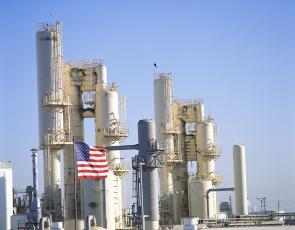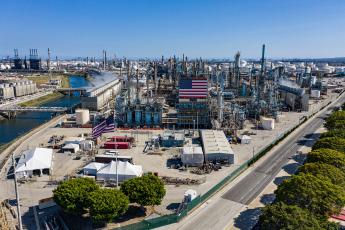Affordable, accessible and sustainably produced energy is key to economic prosperity and human well-being, and petroleum remains an essential, economic source of energy in the United States and around the world. The United States is the now largest producer of crude oil and has the largest, most complex and most efficient refining industry in the world. It is an active participant in the global oil markets, exporting crude oil and refined products to more than 140 countries and importing from more than 70 countries. Yet two of our most important oil trading partners are those that share our borders: Canada and Mexico.
Neighbors Supplying Crude to U.S. Refiners
Canada is the largest supplier of imported crude oil to the United States. In 2020, it supplied more than 60 percent of the 5.9 million barrels per day of crude oil we imported, and 25 percent of the crude oil processed by U.S. refineries. Mexico supplies an additional 10 percent of imported crude oil and is the second largest supplier of imported crude oil to the United States. Many U.S. refiners process imported crude to supply fuels like gasoline, diesel and jet fuel to American consumers and businesses.

Important Export Markets for U.S. Fuels and Feedstocks
Mexico and Canada are also key markets for U.S.-produced fuels and feedstocks, and Mexico is the largest export market for both gasoline and diesel fuel produced by U.S. refineries. In 2020, more than 50 percent of the gasoline and more than 20 percent of the diesel fuel exported from the United States was supplied to Mexico. In total, the United States supplied more than one million barrels per day of refined products to Mexico in 2020 – exports valued at more than $20 billion.

Canada is the third-largest export market for U.S.-produced refined products, accounting for just under 10 percent of total U.S. refined product exports. Canada’s eastern refineries are also a market for U.S.-produced crude oil, which moves by tanker from the U.S. Gulf Coast. Exports of crude oil and refined products to Canada are valued at $15 billion.
Canada Supplies Fuel to the Northeastern United States
Canada is also a supplier of refined products to the United States, primarily to the states in the Northeast. In 2020, U.S. imports of gasoline, diesel, jet fuel and other refined products from Canada averaged more than half a million barrels per day, or more than 8 billion gallons in total for the year.
Spotlight: Canada-U.S. Energy Infrastructure
A complex transportation and logistics system has evolved to safely and efficiently transport these millions of barrels of crude oil and refined products. In the U.S. alone, this system includes:
- Over 224,000 miles of pipelines to transport crude oil, natural gas liquids (NGL) and refined products;
- 36,000 miles of inland waterways and 926 coastal and inland ports to support shipments by tanker and barge;
- 140,000 miles of railway track and 1.6 million freight rail cars;
- Over 4.1 million miles of roadway that support truck shipments of fuels over the “final mile” from regional storage terminals to retail outlets, and from heating oil and propane depots directly to homes and businesses; and
- 1.9 billion barrels of tankage that is used to store crude oil, NGLs and refined products at regional terminals along the supply chain.
Pipelines remain a cornerstone of this interdependent energy and infrastructure network and are the primary mode of transportation used for shipments of crude oil from Canada to U.S. refineries.
The potential closure of the Line 5 pipeline – a dual-line pipeline that runs through Canada and Michigan and transports up to 540,000 barrels per day of light crude oil, light synthetic crude and NGL – has brought this infrastructure network into the spotlight. And the warnings from leaders across the political spectrum and on both sides of the U.S.-Canada border over the detrimental energy, economic and even environmental impacts of closing Line 5 is evidence of just how vital this pipeline is to both countries. Canada views Line 5 as a critical energy asset and has discussed invoking the Transit Pipelines Treaty of 1977, which ensures the unimpeded flow of petroleum products in pipelines linking the two countries. And in the U.S., the refineries responsible for about 50 percent of the jet fuel for the Detroit Airport depend on Line 5 for the supply of crude oil.
U.S.-Mexico-Canada Trade Contributes to the Economic Recovery
Free trade, modern infrastructure and unimpeded market access in Canada and Mexico have increased American energy security and helped support millions of high-paying jobs in refining and related industries. As all three countries recover from the COVID-19 pandemic, it is crucial that leaders avoid policies that would derail this energy system that keeps critical products moving and fuels the economy.


